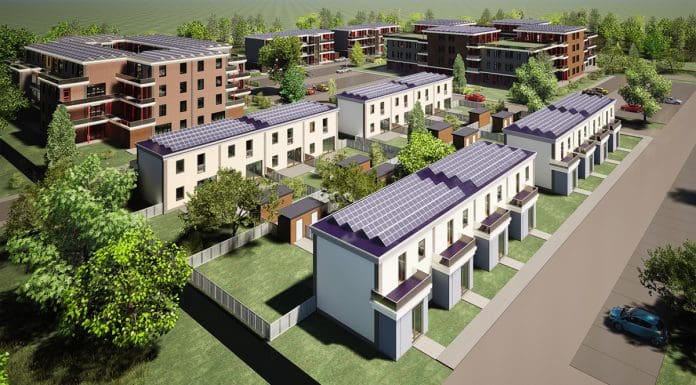The Netherlands faces a similar housing crisis to the UK- and modular building could solve both countries’ crisis and reduce sustainability to boot
True Modular Building (TMB) specialises in crafting attainable, eco-friendly, and comfortable build-to-rent (BTR) housing with modern designs and customisable features, ensuring that residents feel at home both today and tomorrow. Their core belief centers around sustainable smart hybrid construction, where they use raw materials sparingly and leverage their distinct attributes like strength and adaptability to create residential homes.
Carel van Duuren, founder of True Modular Building, is an industry veteran with expertise across engineering, developing, patented technology, business development, CEO and CFO experience and starting companies.
Carel van Duuren, founder and CEO at TMB and speaker at the upcoming World of Modular Europe in Brussels, Belgium, has a long history in the building industry.
“True Modular Building is a spin-off and evolution of my previous companies and expertise in volumetric and modular manufacturing,” says van Duuren. “With the companies Kessel Rental and NxtGen Smart Modular Building, I started with developing kitchens for universities, businesses, conventions and events. This evolved into dismountable container kitchens, which then led me to wonder: How can I make the ideas behind this system more sustainable and repeatable for residential buildings and/or affordable housing?”
One of True Modular Building’s core principles is the use of its proprietary flexible building system, Orange Kit: a configurable platform capable of delivering a diverse range of building types with unique architectures.
Scarce housing and rising carbon emissions present challenges
“I have been following the global housing crisis for a couple of years,” says van Duuren. “The common factor is that a decent home is too expensive and that there are just not enough affordable homes.
“The Dutch housing sector, for example, is experiencing considerable strain by a combination of high demand and a scarcity of affordable homes. This has been a contributing factor to the significant surge in house prices within the Netherlands, placing it among the highest in the European Union.
“Building land in the Netherlands is scarce. The permit procedures are long, there are many regulations and parties involved, and there is a lot of citizen participation (NIMBYism) which delays the process.”
In addition, says van Duuren, the building sector faces multiple operational challenges including escalating raw material costs, labor shortages, and an increasingly critical environmental issue: greenhouse gas emissions.
“Globally, the largest source of greenhouse gas emissions is energy consumption and 40% of this energy is consumed within buildings. An industrialised modular construction approach, noted for its efficiency and potential to reduce emissions will address both the housing and reducing CO2 emissions.”
“The entire construction industry is faced with an urgent challenge of enhancing productivity and sustainability,” says van Duuren. “Conventional on-site construction projects waste significant resources such as time and materials, which negatively affects productivity.
In addition, “the building industry faces many problems such as slow speeds, growing labor shortage, skills scarcity, high costs, and the inability to scale and/or reluctancy to use industrial approaches or new materials.”
The potential of industrialisation and MMC
“Industrialised modular construction has the potential to enhance efficiency and productivity in the construction sector,” says van Duuren, “approaching the practices in the manufacturing sector.”
Van Duuren has identified a number of trends that support his thinking. According to him:
There are a growing number of ‘modular building’ companies and growing confusion about what ‘modular’ actually means.
There is a higher demand for buildings to be adaptable and future-ready. For example, can offices change into houses and schools into hospitals?
There is more attention being paid to biobased insulation and biobased construction materials.
The lack of skilled labor is becoming a critical factor, increasing the need for plug-and-play, easy, fast types of construction.
True Modular Buildings’ approach
“A major stimulus for TMB,” says van Duuren, “is the need to reduce the built environment’s impact on carbon emission and depletion of natural resources through reducing the wasteful consumption of materials and electricity.”
These issues can be addressed, according to van Duuren, with TMB’s approach to building.
“TMB is an innovative company in the construction and housing industry,” says van Duuren. “It specialises in modular construction, which involves production of prefabricated building components off-site and assembling them on-site. TMB’s approach to construction (MMC) is rooted in principles of innovation, sustainability, and social responsibility. We focus on developing proprietary construction systems which streamline the building process, minimise waste, and maximise efficiency.”
Simply put, van Duuren’s aim is to change how housing works. “TMB’s goal is to revolutionise the way homes are built, making them more accessible, adaptable, and environmentally friendly.”
Building for the future at World of Modular Europe
Planned for 1-2 October in Brussels and presented by the Modular Building Institute, World of Modular Europe will provide the perfect forum for van Duuren to share what he’s learned—and to hear the ideas of his industry peers.
“I want to share my insights about the development of a componentised building system. I want to explain the importance of creating maximum adaptability and flexibility, and I want to help attendees understand that change is a constant factor—adaptations are necessary during the entire life of the building. And in so doing, I want to share and learn more about how we can make products infinitely repeatable and simple. How can we make sure we, as builders, are contributing to the economy without adding extra waste or using increasingly precious resources?
“I’m looking forward to sharing my experience and knowledge to help people to think differently and to show that small conceptual changes can make big differences.”
The post Revolutionising housing with True Modular Building at MBI’s World of Modular Europe appeared first on Planning, Building & Construction Today.


